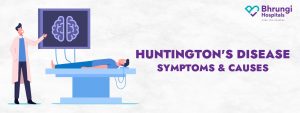
Huntington’s disease is an unstable, inherited condition that causes brain nerve cells’ progressive breakdown (degeneration). As a result, Huntington’s disease has a wide-ranging impact on a person’s functional abilities, resulting in movement, thinking (cognitive), and psychiatric disorders.
Huntington’s disease symptoms can appear at any age, but they are most common in people in their 30s or 40s. If the symptoms occur before 20, it gets referred to as juvenile Huntington’s disease. When Huntington’s disease develops early, the symptoms are somewhat different, and the disease may progress more quickly.
There are medications available to help with the symptoms of Huntington’s disease. However, treatments cannot prevent the condition’s physical, mental, and behavioral decline.
Symptoms
Huntington’s disease is known to cause movement, cognitive, and psychiatric disorders, as well as a wide range of signs and symptoms. The order in which symptoms appear varies significantly from person to person. Some signs and symptoms appear to be more dominant or have a more significant impact on functional ability than others, but this can change throughout the disease.
Movement disorders
Huntington’s disease movement disorders can include both involuntary and voluntary movement issues, such as:
- Involuntary jerking or writhing movements
- Slow or abnormal eye movements
- Impaired gait, posture, and balance
- Difficulty with speech or swallowing
Impairments of involuntary movements, rather than involuntary movements, may significantly impact a person’s ability to work, perform daily activities, communicate, and remain self-sufficient.
Cognitive disorders
The following cognitive impairments are frequently associated with Huntington’s disease:
- Having trouble organizing, prioritizing, or focusing on tasks
- Lack of flexibility or a propensity to become fixated on a single thought, behavior, or action (perseveration)
- Instability of impulse control, which can lead to outbursts, acting without thinking, and sexual promiscuity
- Lack of understanding of one’s behaviors and capabilities
- Slow processing of thoughts or “finding” words
- A problem in learning new information.
Psychiatric disorders
Depression is the most familiar psychiatric disease associated with Huntington’s disease. This isn’t just a reaction to being diagnosed with Huntington’s disease. Instead, depression appears to be caused by brain injury and subsequent changes in brain function. Among the signs and symptoms are:
- Feelings of irritability, sadness, or apathy
- Social withdrawal
- Insomnia
- Fatigue and loss of energy
- Frequent thoughts of death, dying, or suicide
Other common psychiatric disorders are as follows:
- The obsessive-compulsive disorder gets characterized by recurring, intrusive thoughts and repetitive behaviors.
- Mania, which can result in a heightened mood, excessive activity, impulsive behavior, and inflated self-esteem
- Bipolar disorder, a condition characterized by alternating episodes of depression and mania.
Weight loss is prevalent in people with Huntington’s disease and the disorders above, especially as the disease progresses.
Symptoms of juvenile Huntington’s disease
The onset and advancement of Huntington’s disease in children may differ slightly from adults. Among the issues that frequently arise early in the course of the disease are:
Behavioral changes
- Difficulty paying attention
- The rapid, significant drop in overall school performance
- Behavioral problems
Physical changes
- Contracted and stiff muscles that affect gait (especially in young children)
- Tremors or slight involuntary movements
- Frequent falls or clumsiness
- Seizures
When to see a doctor
Confer your doctor if you notice any changes in your movements, emotional state, or mental ability. A variety of conditions can cause the signs and symptoms of Huntington’s disease. As a result, it’s critical to get an accurate diagnosis as soon as possible.
Causes
A single inherited gene defect causes Huntington’s disease. Huntington’s disorder is an autosomal dominant disorder, which means that only one copy of the defective gene is required for the disorder to manifest.
A person inherits two copies of every gene, except genes on the sex chromosomes, one copy from each parent. Therefore, a parent with a defective gene may pass on either the defective or healthy copy of the gene to their offspring. As a result, each child in the family has a 50% chance of inheriting the gene that causes the genetic disorder.
What is the death rate from Huntington’s disease?
The average annual crude mortality rate for deaths caused by Huntington’s disease was 2.27 per million population per year, approximately 80% higher than the corresponding rate of 1.27 per million population per year for deaths caused by Huntington’s disease.
How do Huntington’s disease patients die?
Huntington’s disease is a neurodegenerative autosomal dominant disease that causes choreatic and hypokinetic movements and cognitive decline. The most common reason for death is pneumonia, followed by cardiovascular diseases.
What is the most recent update on Huntington’s disease?
Huntington’s disease results in disability that worsens over time. Unfortunately, there is currently no treatment available to slow, stop, or reverse the progression of HD. People with HD typically die within 10 to 30 years of symptom onset, most commonly from infections (most widely pneumonia) and falls.






